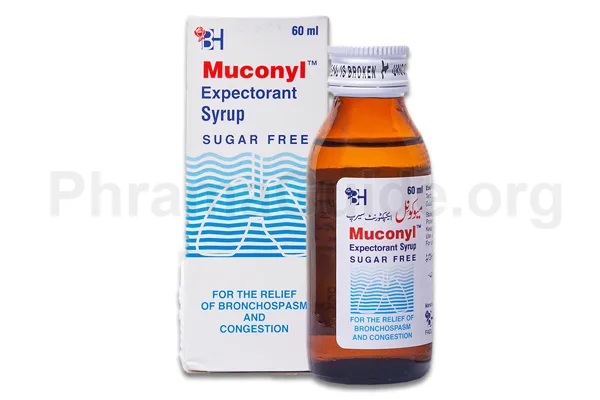Muconyl Syrup is a combination medication that is primarily used to treat coughs that are associated with mucus. The following are some common uses and indications of Muconyl Syrup:
- Bronchial Asthma: Muconyl syrup has bronchodilator properties, that help to relax and widen the airways in the lungs, making it easier to breathe. It is commonly used to relieve symptoms of bronchial asthma, such as wheezing, shortness of breath, and chest tightness. Using Muconyl Syrup helps to open the air passages, allowing for improved airflow and easing breathing difficulties.
- Chronic Obstructive Pulmonary Disease (COPD): Muconyl syrup may be used to manage symptoms associated with chronic obstructive pulmonary disease (COPD), including chronic bronchitis and emphysema. It helps to alleviate bronchospasms and improve airflow, while guaifenesin aids in the removal of mucus from the respiratory tract.
- Cough: The use of Muconyl syrup provides expectorant effects, that help to loosen and thin mucus in the airways, making it easier to cough up and expel. It can also help suppress coughing by relaxing the muscles of the airways.
- Chest Congestion: Muconyl Syrup’s expectorant properties also help in relieving chest congestion caused by excessive mucus production in the airways. It helps thin and loosen the mucus, allowing it to be coughed out more easily.
Off-label Uses of Muconyl Syrup
- Bronchiolitis: Bronchiolitis is a common respiratory infection that affects infants and young children, usually caused by a viral infection. While there is limited evidence supporting the use of Muconyl syrup in bronchiolitis, it may be used in some cases to relieve symptoms such as wheezing and congestion.
- Cystic Fibrosis: Cystic fibrosis is a genetic disorder that primarily affects the lungs and digestive system. Muconyl syrup may be used off-label to help manage symptoms associated with excessive mucus production and airway congestion in children with cystic fibrosis.
- Chronic Cough: Muconyl Syrup may be used off-label to alleviate chronic cough in children when other treatment options have been ineffective.

What is Muconyl?
Muconyl Syrup is a combination of Terbutaline and Guaifenesin in oral liquid form, manufactured and marketed by Barrett Hodgson Pakistan (Pvt) Ltd.
Muconyl Alternatives : Other Brands with Similar Composition
The following are some alternative brands of Muconyl Syrup and their manufacturers.
Mucorid : Pharmix Laboratories (Pvt) Ltd, Pakistan.
Mucorent : Bryon Pharmaceuticals (Pvt) Ltd, Pakistan.
Muconyl : Available Formulations and Strengths
Presently, Muconyl is available in Syrup form.
Muconyl Syrup Each 5ml Contains
- Terbutaline: 1.5mg
- Guaifenesin: 66.5mg
Who Should Not Use Muconyl?
Muconyl syrup has certain contraindications, which means there are specific situations or conditions in which its use is not recommended. Here are some contraindications for Muconyl syrup:
Hypersensitivity: The syrup is contraindicated in individuals who have a known hypersensitivity or allergic reaction to terbutaline, guaifenesin, or any other component of Muconyl Syrup. Allergic reactions can range from mild skin rashes to severe reactions like anaphylaxis.
Heart Conditions: Muconyl Syrup as a bronchodilator, can stimulate the heart and potentially increase heart rate. Therefore, the syrup is generally contraindicated in individuals with severe cardiovascular conditions, such as significant heart disease, arrhythmias, or uncontrolled high blood pressure. It is important to assess the risks and benefits in patients with pre-existing heart conditions before prescribing terbutaline.
Severe Asthma: While terbutaline (an active ingredient of Muconyl) is commonly used to treat asthma, it is contraindicated in individuals with severe or unstable asthma. In such cases, alternative treatments or closer monitoring may be necessary to ensure adequate control of symptoms.
Pregnancy and Breastfeeding: The safety of Muconyl syrup during pregnancy and breastfeeding is not well established. It is generally recommended to avoid or use with caution during pregnancy, especially in the first trimester. Similarly, the use of this syrup during breastfeeding should be discussed with a healthcare professional, considering the potential risks and benefits.
Certain Medical Conditions: Muconyl syrup should be used with caution or avoided in individuals with certain medical conditions, such as diabetes, thyroid disorders, kidney or liver disease, and seizure disorders. These conditions may require special monitoring or adjustment of the dosage.
Recommended Daily Dosage of Muconyl Syrup
Muconyl Syrup Dose for Adults:
- 5 ml (approximately 1 teaspoon), every 4 to 6 hours, as needed.
- However, the exact dosage and frequency may vary depending on the individual’s condition and response to the medication.
- It is important not to exceed the maximum daily dosage as instructed by the healthcare professional.
Muconyl Syrup Dose for Children:
- The dosage for children will depend on their age and weight.
- Dosages are usually lower for children than for adults.
How Muconyl Works?
Muconyl syrup combines two active ingredients: terbutaline and guaifenesin. These ingredients have distinct modes of action:
- Terbutaline: Terbutaline is a selective beta-2 adrenergic receptor agonist. It acts as a bronchodilator, which means it relaxes and widens the airways in the lungs. When terbutaline is administered, it stimulates the beta-2 adrenergic receptors in the smooth muscle lining the airways. This stimulation leads to the relaxation of the airway muscles, resulting in the dilation of the bronchial tubes. As a result, air can flow more freely into and out of the lungs, alleviating symptoms such as wheezing, coughing, and shortness of breath.
- Guaifenesin: Guaifenesin is an expectorant that helps to thin and loosen mucus in the airways. It works by increasing the volume and reducing the viscosity of respiratory tract secretions. Guaifenesin does not directly act on the airway’s smooth muscles but rather assists in the management of respiratory conditions by making it easier for mucus to be expelled through coughing. By thinning the mucus, it can help facilitate its clearance from the lungs and respiratory passages, providing relief from congestion and cough.

Leave A Comment